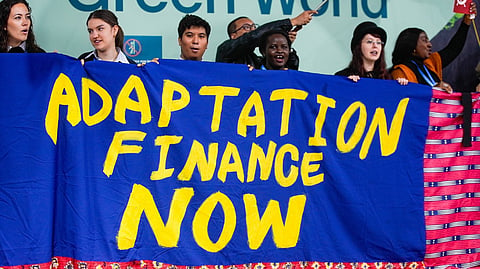

The 29th Conference of Parties (COP29) to the United Nations Framework Convention on Climate Change in Baku, Azerbaijan, began November 11, 2024. Here’s a look at what happened on the ninth day of COP29. Also read the diary for November 11, November 12, November 13, November 14, November 15, November 16, November 18, November 19 and November 21.
Deliberations between Parties on the NCQG have been slow but progressing. During the COP Presidency’s stocktake, the COP29 Lead Negotiator announced that a new draft text would be produced by the next day, taking into account the latest rounds of negotiations. The Lead Negotiator proceeded to provide updates on key issues:
• On structure, divergent views have remained.
• On the quantum, all Parties agree that there should be a quantum for climate finance. However, there are different proposals for the provision element of the goal, ranging from US $900 billion, US $600 billion, US $400 billion and US $100 billion.
• On the contributor base, all Parties agree that addressing the expansion of the contributor base does not reopen Article 9 of the Paris Agreement.
• Groups have raised concerns around debt and want the NCQG to be framed in grant-equivalent terms.
• Some groups have made the case for burden sharing, but this is not uniformly agreed upon.
Later in the day, the chairs of the G77 and China bloc, the African Group and the Like-Minded Developing Countries (LMDC) addressed a joint press conference, where they spoke about their expectations and red lines regarding the upcoming draft text. They stressed on their demand of US $1.3 trillion annually, primarily from public sources in developed countries. They further stated that Article 9 of the Paris Agreement is not open for reinterpretation. However, there remains room for voluntary contributions to the NCQG from the Global South. They reiterated that developed countries need to engage on these issues keeping in mind the urgency of the climate crisis, and that political will is required to push through an ambitious climate finance target.
Finally, the new draft text was released by the Presidency, which streamlines the text from a 25-page document to 10 pages. The text has been restructured into sections once again, and the Goal Formulation section is of particular importance. Here, the major differences between developed and developing countries are highlighted as two distinct options.
Option 1 speaks to the provision and mobilisation of climate finance but does not mention the sources of the provision or mobilisation components. On the other hand, option 2 speaks about scaled-up finance and increased investment, framing the NCQG as ‘global finance for climate action’ which risks deviating from the responsibility of developed countries to support developing countries in achieving their climate goals.
Further, no quantum has been quoted in the text yet, while Parties are expected to continue deliberating and working towards a final outcome on the NCQG in the coming days.
During the Presidency’s stocktake session, Grace Fu from Singapore shared that most groups and Parties would like to do without the international registry under Article 6.2 having an issuance function. But there are diverging views on whether the international registry should be able to transfer and hold units. There was a divide whether the international registry was meant to serve as a purely accounting registry or also intended to serve as a transaction registry. There is a convergence on exploring a dual layer registry system. The international registry will form an accounting layer that tracks and records Internationally transferred mitigation outcomes with the view functionality while the UNFCCC could provide an optional service as extension outside of 6.2 which provides Parties with issuance functionality.
At a press conference, the EU said they are keen on transparency in Article 6 and stressed the need for integrity. Bangladesh expressed their concerns over the use of Article 6 to bring in additional financing into the new climate finance goal being negotiated, the NCQG. Developed countries, the delegation added, must take the lead on mitigation, rather than shifting burden on developing countries for carbon markets, as transparency remains a major issue.
Amid talks about expansion of the donor base for NCQG, a negotiator on behalf of Least Developing Countries (LDC) told DTE that developed countries are trying to expand the donor base. But under the principles of the Paris Agreement, there is a mandatory provision for developed countries to provide financial support to developing countries. The negotiator added that the Paris Agreement allows for voluntary contribution, which means countries in a position to do so can contribute to the process. At another press conference, the LMDCs said there was no need to reinterpret or rewrite the Paris Agreement and the convention. NCQG should be grounded on the mandate of the Paris Agreement, which clearly states the provision of finance moves from developed countries to developing countries, the negotiator added.